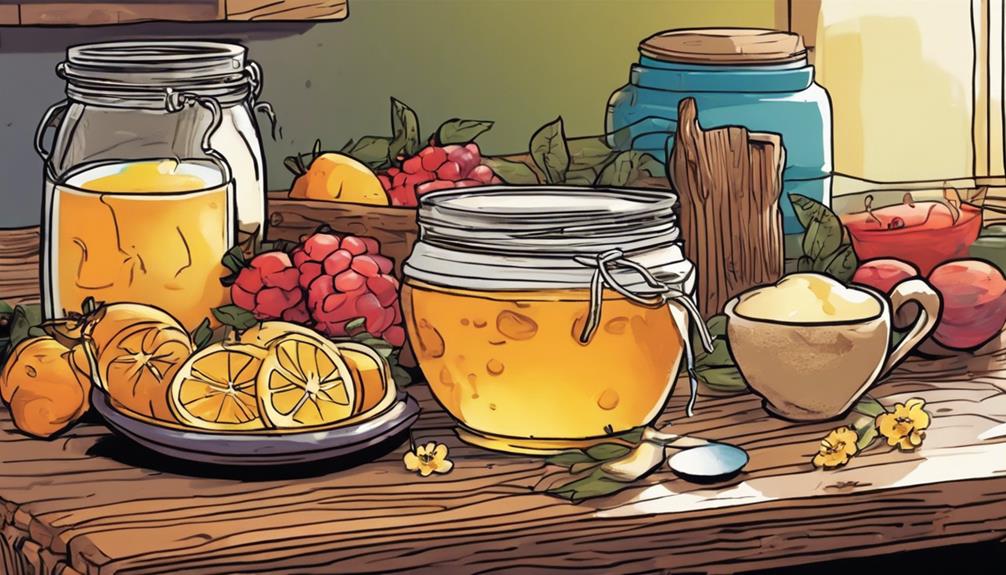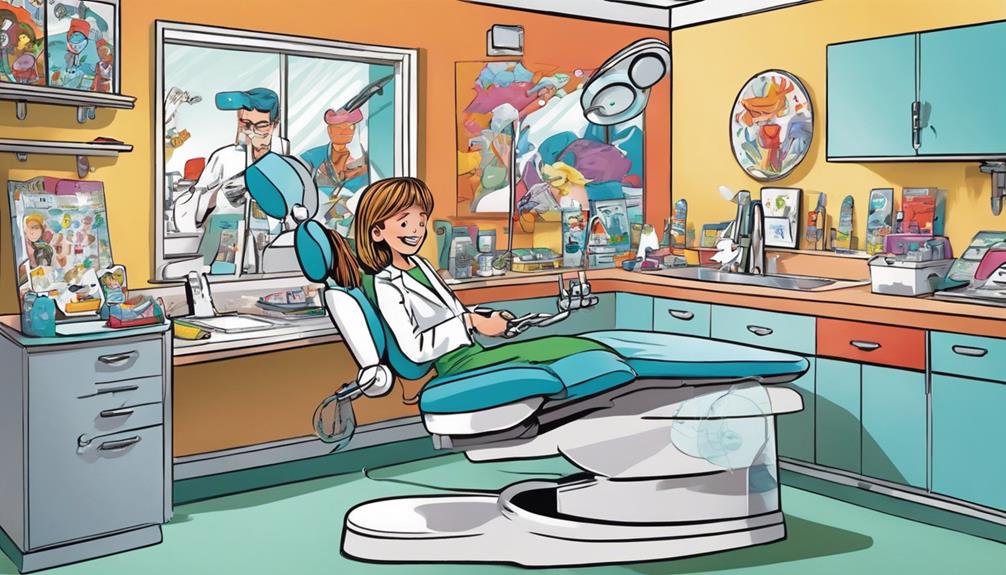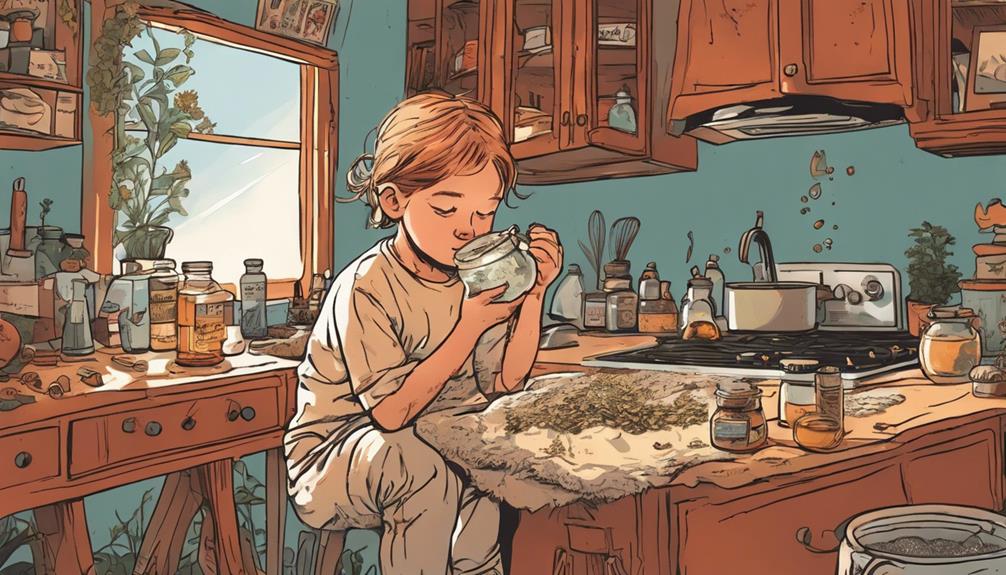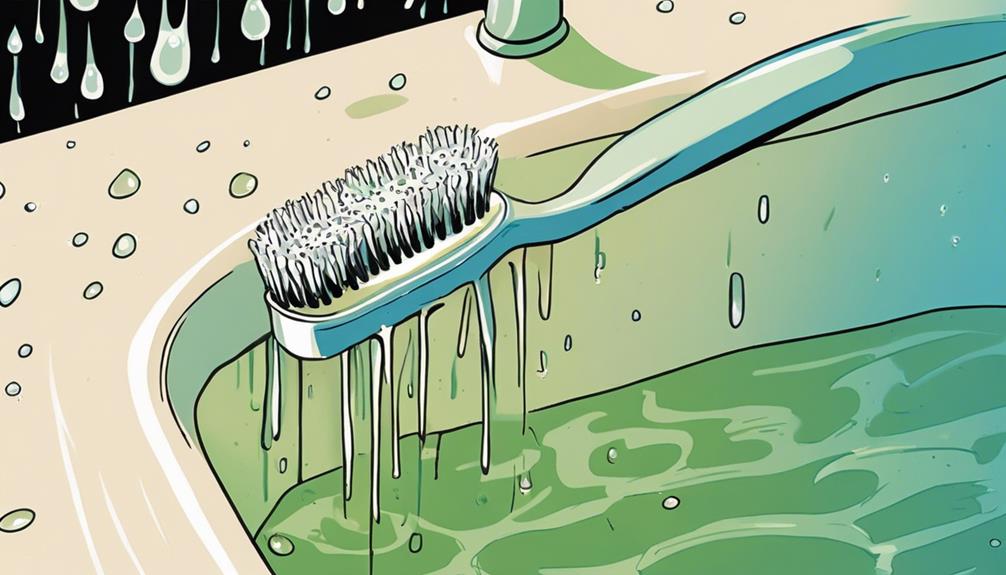If your child's got a toothache, you can try some effective natural remedies. Start with a warm saltwater rinse to help reduce swelling and kill bacteria. Clove oil works wonders too; just soak a cotton ball and apply it to the painful area for relief. You can also crush garlic into a paste, which fights plaque and offers pain relief. For a cooling effect, freeze a peppermint tea bag and place it against the gums. And don't forget a cold compress on the cheek to ease inflammation. There are more tips and tricks to explore for keeping those smiles healthy!
Key Takeaways
- Rinse with warm saltwater to kill bacteria and reduce gum swelling for relief from toothache discomfort.
- Apply clove oil on a cotton ball to the affected area for natural anesthetic pain relief.
- Use garlic paste, made from crushed cloves, to combat dental plaque and provide antibacterial effects.
- Freeze a peppermint tea bag and place it against the cheek to create a numbing sensation for pain relief.
Effective Home Remedies

When your child has a toothache, what effective home remedies can you use to provide quick relief?
Start with warm saltwater. Mix half a teaspoon of salt in a glass of warm water and have your child rinse their mouth. This helps kill bacteria and reduces gum swelling, giving temporary relief from pain.
Next, consider using clove oil. Soak a cotton ball in clove oil and apply it to the affected area; its natural anesthetic properties can provide immediate comfort.
You can also create garlic paste by crushing one or two cloves of garlic. Applying this paste can combat dental plaque and offer natural pain relief due to its antibacterial properties.
A peppermint tea bag can also soothe the pain. Freeze the tea bag, then place it between your child's cheek and gums for a numbing effect.
Finally, a cold compress on the outer cheek near the painful area can constrict blood vessels and reduce inflammation, offering simple relief.
If the toothache persists, don't hesitate to consult a pediatric dentist for further assistance.
Understanding Toothache Causes

Toothaches in children often stem from various causes, including tooth decay, gum disease, or the emergence of new teeth.
Tooth decay is the most common culprit, often resulting from sugary snacks and poor dental hygiene. If your child isn't brushing regularly or flossing, bacteria can thrive and lead to cavities, causing significant pain.
Gum disease can also be a source of dental discomfort, marked by inflammation and infection of the gums. This condition can cause your child to experience discomfort, especially when chewing or brushing.
Additionally, a broken tooth may lead to sharp pain and tooth sensitivity, particularly in response to temperature changes or when pressure is applied.
Tooth sensitivity arises when the enamel weakens, which can make eating hot, cold, or sweet foods painful.
During natural dental shifts, such as losing baby teeth or the emergence of permanent teeth, your child may experience temporary discomfort.
Understanding these toothache causes can help you address the pain effectively and seek out appropriate natural remedies or interventions.
Importance of Dental Visits

Regular dental visits play an essential role in catching issues like tooth decay and gum disease early, helping to keep your child's smile healthy and pain-free. The importance of dental visits can't be overstated, especially when you consider that the American Academy of Pediatric Dentistry recommends scheduling your child's first dental exam by their first birthday or within six months after their first tooth erupts.
These routine dental care appointments allow the pediatric dentist to identify potential problems, such as cavities, before they escalate. Early intervention during these check-ups can prevent long-term complications, saving your child from more invasive treatments down the road.
In addition, consistent dental visits help instill good oral hygiene habits, setting the foundation for a lifetime of oral health.
Preventative Oral Health Tips

Keeping your child's teeth healthy starts with establishing strong preventative oral health habits early on.
Encourage regular brushing with fluoride toothpaste twice a day. This practice effectively removes plaque and prevents tooth decay.
Alongside brushing, teach your child proper flossing techniques to get rid of food particles and plaque buildup between their teeth. This helps reduce the risk of cavities and gum disease.
You should also limit sugary snacks and drinks, as high sugar consumption is a leading cause of tooth decay in kids. Instead, opt for healthy snacks like fruits and vegetables to keep their teeth strong.
Educate your child about the importance of rinsing their mouth with water after meals, and emphasize avoiding prolonged exposure to sugary substances.
Lastly, schedule regular dental check-ups every six months. These visits are vital for the early detection of any dental issues and maintaining overall oral health.
Community Support and Resources

Finding community support and resources can make a significant difference when you're managing your child's tooth pain and promoting good oral hygiene practices.
Local parenting groups often provide a wealth of shared experiences and home remedies that can help alleviate your child's discomfort. Engaging with these groups can lead you to valuable tips and encouragement from other parents who understand your challenges.
Participating in dental health workshops offered by local clinics can also be beneficial. These free or low-cost community events teach proper brushing techniques and the importance of nutrition in preventing toothaches. Additionally, pediatric dental associations provide educational materials that equip you with evidence-based strategies to tackle tooth pain effectively.
If home remedies aren't enough, make sure you know how to access professional help. Local health departments can refer you to dental care services, ensuring your child gets the care they need.
Frequently Asked Questions
How Do You Stop a Child's Tooth From Hurting Fast?
To stop your child's tooth from hurting fast, rinse with warm salt water, apply a cold compress, or use clove oil. If pain persists, consider over-the-counter pain relievers after checking the dosage for children.
What Helps Children's Toothache?
When your child has a toothache, try rinsing with warm salt water, applying clove oil for numbing, or using a cold compress to reduce swelling. These methods can quickly help alleviate their discomfort.
What's the Best Natural Thing for a Toothache?
Ever wondered how to tackle a toothache naturally? You can try clove oil for numbing pain, warm saltwater to reduce swelling, or peppermint tea bags for a soothing effect. These remedies can really help!
How Do You Get Rid of Tooth Pain Asap?
To get rid of tooth pain ASAP, you can rinse with warm salt water, apply a cold compress, or use clove oil on the affected area. Over-the-counter pain relievers also help alleviate discomfort quickly.
Can Natural Remedies for Kids’ Toothaches Help Prevent Gum Disease in Children?
Natural remedies for kids’ toothaches like clove oil or saltwater rinses can help alleviate pain and discomfort. By addressing toothaches early, parents can also help prevent early signs of gum disease in children. Regular dental check-ups and good oral hygiene can also play a crucial role in maintaining children’s oral health. Encouraging kids to eat a healthy diet that includes plenty of calcium-rich foods, like cheese, yogurt, and leafy greens, can also contribute to strong teeth and prevent toothaches. In addition, avoiding sugary snacks and drinks can help reduce the risk of cavities and maintain overall oral health. Parents can also consult with a pediatric dentist to learn more about the best foods for strong teeth and how to instill good dental habits in children from a young age.
Conclusion
To sum up, while you might consider whipping up a concoction of clove oil and honey to soothe your little one's toothache, remember that your homemade remedies are no substitute for a dentist's magic touch.
After all, who needs professional care when you've got Pinterest?
So, keep those natural remedies handy, but don't forget to book that appointment—because nothing says “I care” like a dentist's chair and a mouthful of fluoride.
Happy healing!









